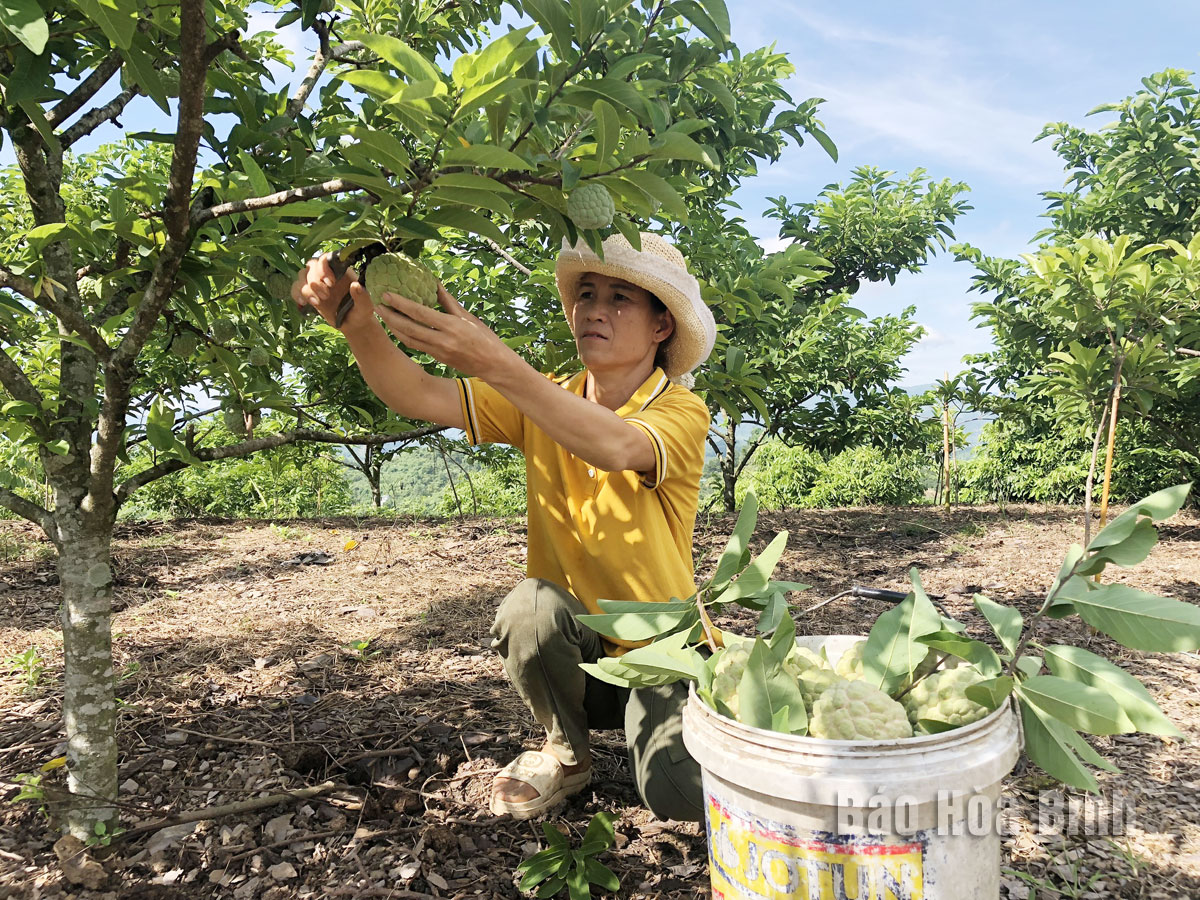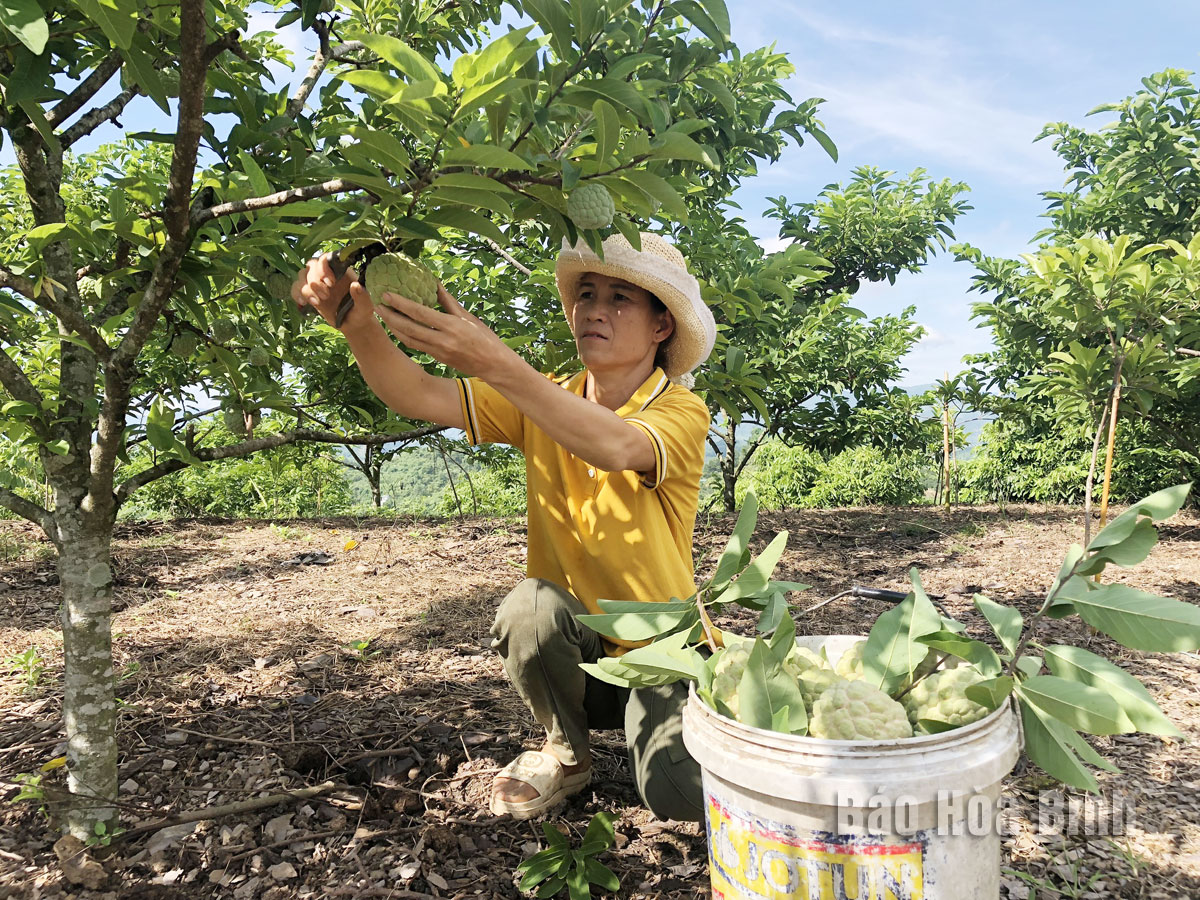
(HBO) - As August comes, custard apple in Thu Phong commune (Cao Phong) enters the harvest season. This year, the fruit has a good season and high quality, promising a significant income for growers.

With more than 400 trees under harvest, Pham Thi
Thao's family in Dinh Cun village, Thu Phong commune (Cao Phong), expects to
earn about 150 million VND (6,208 USD).
Custard apple has been grown on Thu Phong land for a long
time. With the economic value it brings about, over recent years, many
households have invested in planting this kind of fruit and expanding its area.
Currently, the whole commune has over 27 hectares, mainly in Dinh Cun hamlet.
Dinh Cun custard apple is famous for its quality and size, because of the
farmers' ability to cultivate and take special care of it, and fragrant, and
has a distinctive sweet taste.
To develop the brand of Dinh Cun custard apple, Thu Phong
commune has encouraged locals to focus on production processes in accordance
with Vietgap standards to ensure food safety and hygiene, and look for and
develop new varieties with high quality. Recently, the commune mobilised
households to establish a cooperative group with 25 members. At the end of
2022, this product obtained 3-star OCOP (one commune one product)
certification.
Vu The Dung, Chairman of Thu Phong Commune People's
Committee, said that the recognition of Thu Phong custard apple as a 3-star
OCOP product has created favourable opportunities for growers, as they can be
supported and guided on how to ensure the quality of the fruit during
transportation.
Bui Van Dan, head of the Agriculture and Rural Development
Desk of Cao Phong district, said that the district People's Committee has
directed relevant agencies and localities to determine the planting area and
process in order to maintain the Cao Phong custard apple brand so that it can
become one of the key crops of Thu Phong commune.
According to data from the Hoa Binh Provincial Party Committee, the industrial production index for the first six months of 2025 is estimated to have increased by 20% compared to the same period last year. This marks the highest year-on-year growth rate for this period since 2020.
In the first six months of 2025, Hoa Binh province’s export turnover was estimated at 1.145 billion USD, marking an 18.11% increase compared to the same period in 2024. Import turnover was estimated at $ 804 million, a 17.15% increase, which helped the province maintain a positive trade balance.
The lives of the ethnic minority farmers in Tan Lac district have gradually improved thanks to the new directions in agricultural production. This is a testament to the collective strength fostered through the professional associations and groups implemented by various levels of the district’s Farmers’ Union.
With the motto the "product quality comes first,” after nearly one year of establishment and operation, Muong village’s Clean Food Agricultural and Commercial Cooperative, located in Cau Hamlet, Hung Son Commune (Kim Boi district), has launched reputable, high-quality agricultural products to the market that are well-received by consumers. The products such as Muong village’s pork sausage, salt-cured chicken, and salt-cured pork hocks have gradually carved out a place in the market and they are on the path to obtaining the OCOP certification.
In the past, the phrase "bumper harvest, rock-bottom prices" was a familiar refrain for Vietnamese farmers engaged in fragmented, small-scale agriculture. But today, a new spirit is emerging across rural areas of Hoa Binh province - one of collaboration, organisation, and collective economic models that provide a stable foundation for production.
Maintaining growing area codes and packing facility codes in accordance with regulations is a mandatory requirement for agricultural products to be eligible for export. Recently, the Department of Agriculture and Environment of Hoa Binh province has intensified technical supervision of designated farming areas and packing facilities to safeguard the "green passport" that enables its products to access international markets.



